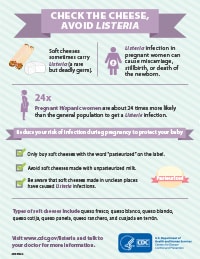C0ntext
-
Two separate outbreaks of listeria, a bacteria which can contaminate food, have been reported in the United States and Canada in recent weeks.
What is listeria and listeriosis?
- Listeria or Listeria monocytogenes is a type of bacteria found in soil, vegetation, water, sewage and even the faeces of animals and humans.

Credit: CDC - Listeria-contaminated food can lead to an infection called listeriosis.
What are the symptoms of listeriosis?
- Most people who ingest listeria-infected food do not fall sick or develop symptoms.
- The bacteria can be present in the infected person’s system for up to two months until the symptoms present themselves, making it difficult to establish the connection between what was consumed and the infection.
- Symptoms include vomiting, nausea, cramps, severe headache, constipation and fever.
Who is vulnerable to listeriosis?
- People with compromised immune systems, pregnant persons and their offspring and the elderly (aged 65 and above) are vulnerable.
- The US outbreak has a median age of 75.
- Listeria can result in hospitalisation and even death for the immunocompromised and the elderly.
- According to the CDC, pregnant women are 10 times more likely to develop a listeria infection and risk pregnancy loss, premature birth or even life-threatening infection in the newborn.
- Some foods are more likely to have listeria than others, including milk, raw sprouts, deli meats and hot dogs, soft cheeses and smoked seafood.
What is the treatment for listeriosis?
- Treatment depends on the extent of the infection.
- In many cases, intestinal listeriosis manifests within a day or two of consuming the contaminated food item and may lead to diarrhoea and vomiting.
- The treatment is similar to one for a routine stomach infection and could require antibiotics.
- If the infection spreads beyond the intestines, it leads to invasive listeriosis.
- Severe symptoms present themselves two weeks after the food has been consumed.
What do we know about the listeria outbreaks?
- The CDC says, “When two or more people get the same illness from the same contaminated food or drink, the event is called a foodborne disease outbreak”.
- The true numbers of those infected may be higher than reported as the symptoms are not immediately visible.
- Some people may recover without medical care.
Has any advisory been issued?
- The CDC has advised the public, especially high-risk groups, to avoid unheated deli meats, cheeses and salads and opt for packaged items instead.
- Deli equipment, surfaces and food can be easily contaminated, while refrigeration of deli items does not kill the bacteria.
- All deli meats are recommended to be heated to an internal temperature of 165 degrees F before consumption to kill Listeria, if present.
- Refrigerators, containers and surfaces that have come into contact with deli meats are advised to be thoroughly sanitised.
Source: IE
Visit Abhiyan PEDIA (One of the Most Followed / Recommended) for UPSC Revisions: Click Here
IAS Abhiyan is now on Telegram: Click on the Below link to Join our Channels to stay Updated
IAS Abhiyan Official: Click Here to Join
For UPSC Mains Value Edition (Facts, Quotes, Best Practices, Case Studies): Click Here to Join
